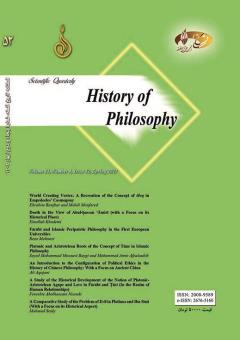An Introduction to the Configuration of Political Ethics in the History of Chinese Philosophy: With a Focus on Ancient China
Subject Areas : Philosophical roots of Eastern religions
1 - Assistant Professor, Department of Political Science, Research Institute of Social Sciences, Research Institute of Hawzah and University, Qom, Iran
Keywords: political ethics, history of Chinese political philosophy, comparative study, paradigm, Mensius, Confucius, Tao,
Abstract :
The history of philosophy in China has always possessed some ethical and political roots since the time of its emergence and in the process of its evolution and development. One of the common features of all Chinese political philosophers, in spite of all their theoretical differences, is their belief in the dependence of the value of government and rulership on its moral and ethical status and prestige. In this way, they tried to access moral principles in order to obligate the Chinese to conform to an Ideal government. Accordingly, while acknowledging the linguistic and semantic ambiguities of authorities’ different theories, the present study investigated the problem of the nature of political ethics and its relationship with government in Chinese political philosophy (with an emphasis on ancient China) following a comparative method. Here, the author proposes the hypothesis that, despite some shared general viewpoints, there are various approaches to the whatness and quality of political ethics and its relationship with government and its duties and moral-political responsibilities. The differences between approaches can be studied in relation to ontology, epistemology, and anthropology, on the one hand, and in relation to the relationship between ethics and politics, nature of government, and legitimacy and duties of government, on the other hand. For example, regarding the problem of the nature of government, Laozi, Yang Zǐ, and Tsung Zǐ, who are Taoists, criticize the government and consider it a kind of unnecessary evil that has no function except for increasing the complexity and adversity of affairs. Therefore, they vote for a minority government, advocate the absence of a dominant central government, and prescribe a conformity between Man’s political conformity with a decentralized government. By contrast, Confucius, Mensius, Tung Chung-su, Han Fei Zǐ, and Chu His consider the government to be a necessary good with major ethical-political duties.
شمارۀ 2، ص70 ـ 51.
جای، چو؛ جای، وینبرگ (1387) تاریخ فلسفه چین باستان، ترجمۀ ع. پاشایی، تهران: مازیار.
چن، لی فو (1373) راه کنفوسیوس، ترجمۀ گیتی وزیری، مشهد: آستان قدس رضوی.
چینگ، جولیا (1383) ادیان چین، ترجمۀ حمید رضا ارشدی، تهران: مرکز بازشناسی اسلام و ایران.
حمزئیان، عظیم؛ سلمانی،یاسمن؛ شاهنگیان، نوریالسادات (1398) «تحلیل و ارائه نظام معرفتشناسی تائویی»، پژوهشنامه ادیان، شمارۀ 26، ص 150ـ 125.
رجایی، فرهنگ (1372) تحول انديشۀ سياسی در شرق باستان، تهران: قدس.
عالم، عبدالرحمن (1377) انديشۀ سياسی چين باستان، تهران: دفتر مطالعات سياسي و بينالمللي.
کریل، اچ.جی (1380) کنفوسیوس و طریقۀ چینی، تهران: سروش.
کنفوسیوس (1375) مکالمات، ترجمه کاظم زاده ایرانشهر، تهران: علمی و فرهنگی.
لائوتزو (1400) دائو ده جینگ، ترجمۀ اسماعیل رادپور، تهران: زندگی روزانه.
مارش، دیوید؛ استوکر، جری (1384) روش و نظریه در علوم سیاسی، ترجمۀ امیرمحمد حاجییوسفی، تهران: پژوهشکدۀ مطالعات راهبردی.
منسیوس (1400) کتاب منسیوس، ترجمه احسان دوستمحمدی، تهران: ققنوس.
نظرپور، حامد (1399) «مقایسۀ «حکمت» در کتاب حکمت با «دِه» در دائودهجینگ»، حکمت و فلسفه، شمارۀ 61، ص 147ـ 123.
نوری، مرجان؛ شاهنگیان، نوریسادات (1400) «بررسی مفاهیم اصلی نظام کیهانیـاخلاقی نوکنفوسیوسی»، جاویدان خرد، شمارۀ 40، ص 314ـ 291.
یائو، یانگ (1390) «فلسفه چینی در عصر جهانی شدن»، ترجمۀ امیرحسین تقیپورجاوی، کتاب ماه فلسفه، ش 53، ص 73ـ 68.
يوـلان، فانگ (1380) تاريخ فلسفۀ چين، فريد جواهركلام، تهران: فرزان.
Bary. W.T. (1981). Neo Confocian Orthodoxy and the learning of the mind – and – heart. New York: Columbia University Press.
Goodrich, C. (1957). A short history of the Chinese pople. London: Gerge Allen & unmin Ltd.
Greel, H. Gishen Pu-hui (1974). Aehinese Politicat Philosopher of the fourth century BC. Chcagoi university of Chicago Press.
Hsiao, K.-C. (1979). History of Chinese political thought. princeton University press.
Kung, H & Ching, J. (1989). Christianity and Chinese Religions. NewYork: Double day.
Liang, C. (1980). History of Chinese Political Thought. London: kegan Paul.
Lin, M. (1942). Men and Ideas. Washington: Kennikat Press/ port,.
Max Weber (1946). The Religion of China: Canfucianism and Taoism. New York: free press.
Mejzger, T.A. (1977). Escap from predicament: Neo Conficainism and China's evolving political culture. New Yourk: Comlumvia University press,
Mencius (1970). The works of Mencius. Iames Legge. New Yourk.
Mencius (1970). The works of Mencis. Iames Legge. New Yourk.
Rowley H.H. (1956). Prophecy and religion in ancient China and Israel. London: Athlone Press.
Waston, B.(Trans)(1967). Basic Writing of Mo Tzu, Hsun Tzo, and Han fei Tzu, New Yourk: Colombia University press.
Weber, M. (1946). Essays in Saciology. New York: Oxford.
Yo-Lan, Fung (1948). A short history of Chinese philosophy, New Yourk: The Macmillan press.

